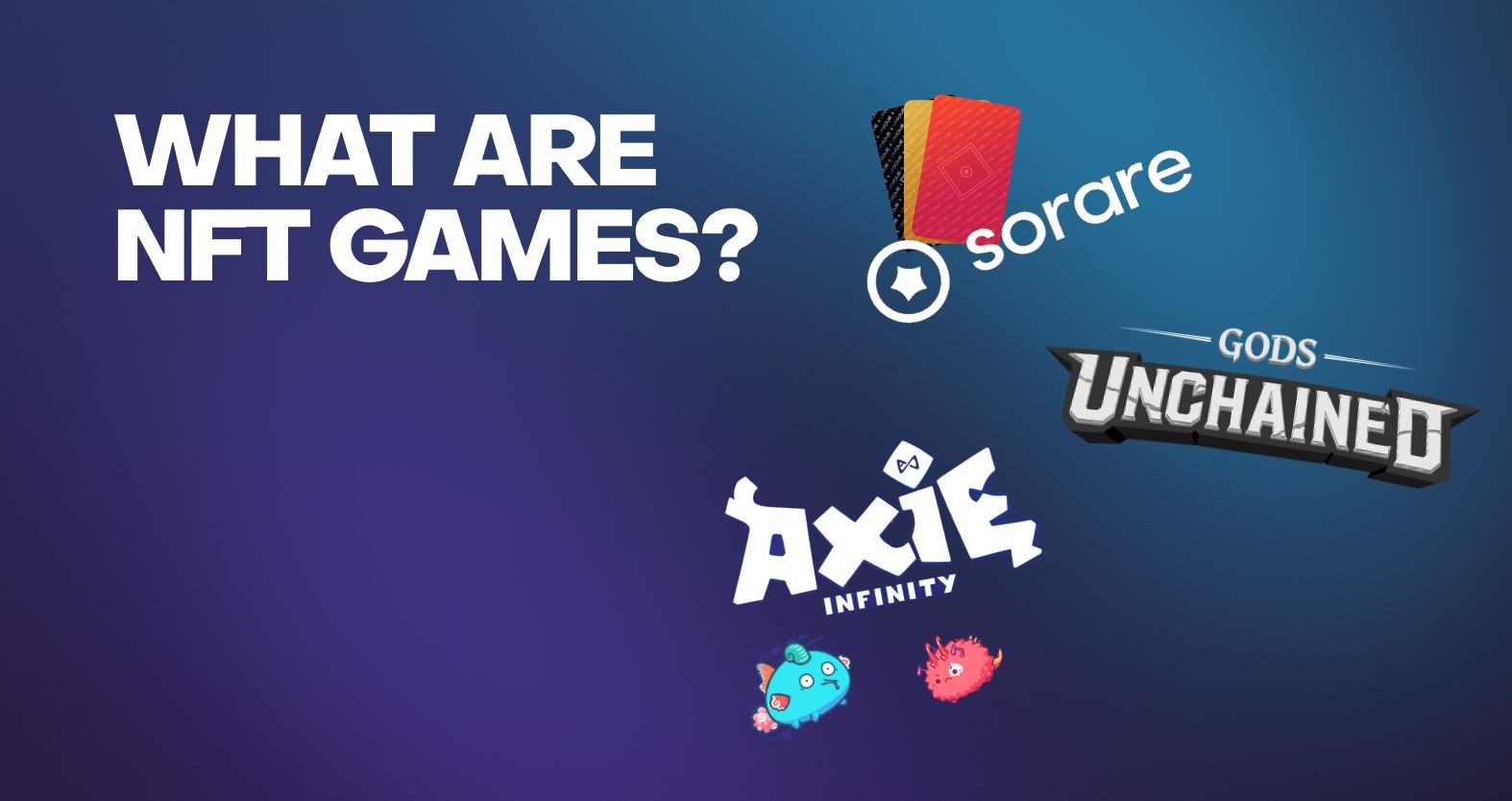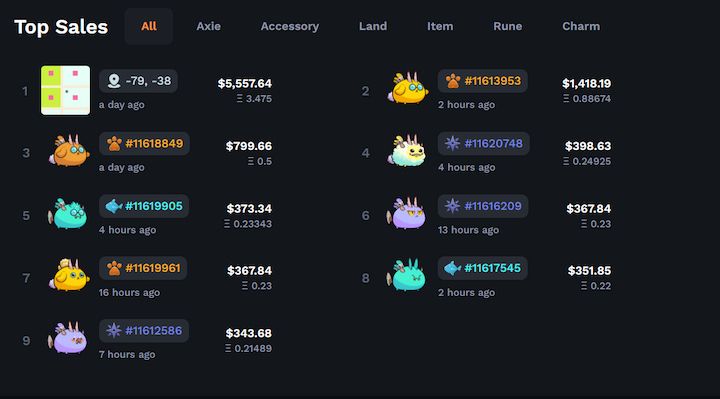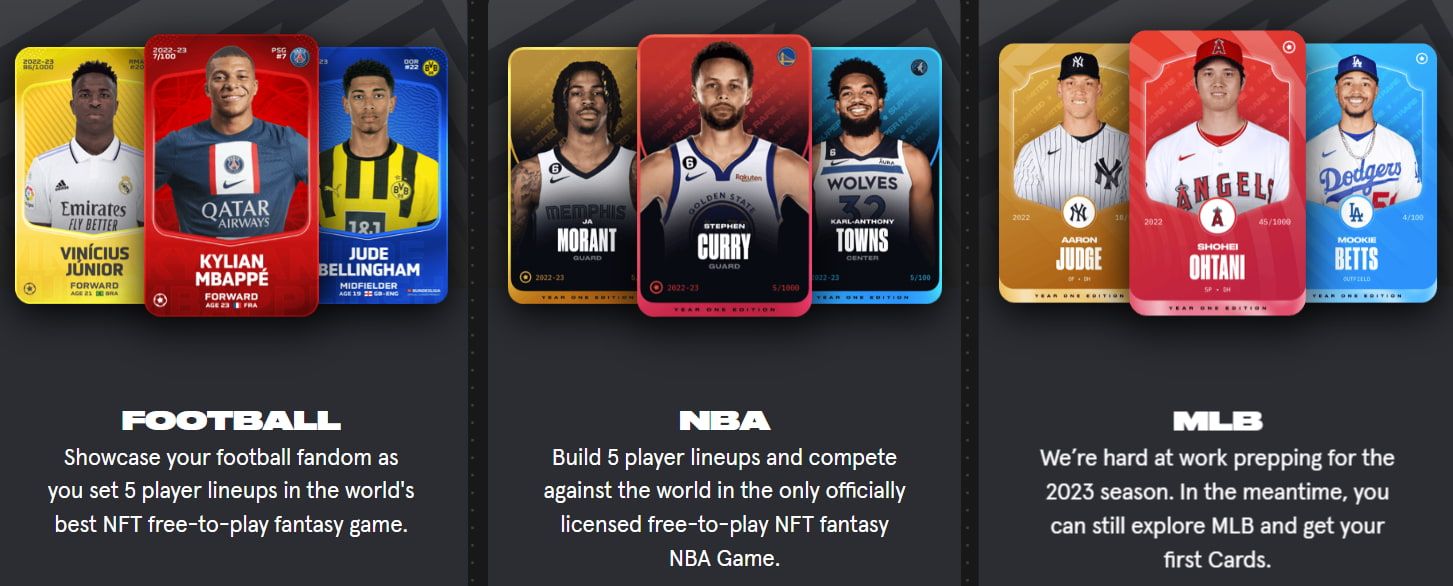
Table of contents
NFT games are unique gaming experiences that use blockchain technology to create digital assets that gamers can own and trade freely, allowing for greater monetization by end users.
Blockchain-based games are now enjoying more popularity as developers improve on existing options and create new riveting titles. Using NFTs, game developers can directly connect in-game items and characters to blockchains, providing players with verifiable ownership of unique digital assets. As crypto and gaming communities become increasingly interested in blockchain gaming and further monetizing their gameplay, developers are offering more opportunities for players to have fun while earning.
What Are NFT Games?
NFT games, play-to-earn (P2E) games, or non-fungible token games, offer a gaming experience that uses blockchain tech to create unique digital assets that gamers can earn, own, buy, sell, and trade. NFT games blend the worlds of traditional gaming and the crypto market, allowing players to earn, directly possess, and trade digital assets that have real-world value.
NFT games offer a robust level of interoperability between different games, platforms, and marketplaces that traditional games and gaming assets are not capable of. Since these games use blockchain technology to store and manage gaming assets, players can easily use or swap them across various platforms. This creates a connected gaming experience for players and new possibilities for game developers and creators, setting the stage for what everyone commonly refers to as 'the metaverse'.

How Do NFT Games Work?
NFT games use blockchain technology to create confirmably unique digital assets. These assets are authenticated via cryptography, ensuring that they cannot be replicated. The uniqueness establishes a transparent market and ensures real-world value via scarcity and usability.
Anyone playing an NFT game can buy, earn, or create NFTs that are then stored on a blockchain. The players can subsequently trade them on marketplaces like OpenSea, Rarible, or SuperRare, as well as native marketplaces within NFT games. Users enjoy an expansive digital economy where players can collect, build, trade, and participate in NFT-based events and challenges throughout these virtual worlds.
There are many other use cases of NFTs within the games, such as representing an in-game item, a special badge, a digital collectible, or virtual in-game land. Blockchains hold all players' NFT ownership records in a secure and immutable database, giving players full ownership and allowing them to trade their assets freely without broad third-party restrictions.
Advantages of NFT Games
NFT games offer various benefits to game developers and players. Some of the benefits include the following:
Gamer Asset Control
Players have control over their digital assets and can earn crypto by trading, staking, or utilizing their NFTs. Players also earn incentives for playing certain blockchain-based games.
High Level of Security and Reliability
NFT games offer a highly secure environment through blockchain tech, ensuring robust security parameters and integrity for players.
Revenues From Transaction Fees
When players sell or exchange an NFT, developers may charge a transaction or royalty fee on secondary sales, which can significantly add to the studios underlying revenues.
Transparency
The transparency of digital transactions in NFT games helps demonstrate the rarity of NFTs and may increase their value over time (especially within widely adopted games).
Types of NFT Games
There are several types of NFT games with unique features and characteristics. Examples include:
Play-To-Earn Games
Play-to-earn games allow players to earn NFTs in-game and trade on the open market. These games typically have a built-in economy where users can earn by playing the game and purchasing assets that may appreciate over time. These games incentivize users by allowing them to earn NFTs with real-world value via gameplay and growth. Play-to-earn games are a way for gamers to monetize the time and effort that they spend on a game.
In-Game NFTs
In-game NFTs are digital assets representing elements within a gaming environment, such as reward boxes, skins, armor, potions, and other everyday inventory items in 'traditional' video games. These NFTs are unique, non-replicable, and used by players to enhance their gaming experience. In-game NFTs allow players to own individual digital assets with intrinsic value. Interestingly, this value can increase according to the NFT's rarity. The value of these in-game NFTs may depend on various attributes, such as their cosmetic appearance or utility.
Economics of an NFT Game
Each NFT game offers a unique way for players to earn or find tokens to trade with other players, or to convert their cryptocurrencies and NFTs on exchanges. NFT games leverage the disruptive economic attributes of blockchain technology to add revenue-generation models for game developers and players.
However, a portion of the value of an NFT depends on how many other users appreciate it, similar to a piece of art. While value can vary significantly over time, financial speculation can also play a role. Therefore, as with any economic transaction, players can gain and lose money while transacting with NFTs in a gaming environment.
Common Pitfalls of Handling NFTs
Some common pitfalls of handling NFTs include the following:
Lack of Understanding
Since the technology is still nascent, there could be mistakes in handling and managing NFTs if users do not adequately understand the technology.
Scams and Frauds
Scammers and fraudsters are common in the rapidly growing NFT market. Hence, NFT users must conduct in-depth research on an NFT or NFT game before playing.
Storage and Security
Some users may find storing and securing their NFTs challenging. Users who do not understand safe practices risk losing access to their private keys or risk potential losses from malicious actors gaining access to their accounts.

Top 5 NFT Games
Some of the most popular NFT games currently on the market include the following:
1) Axie Infinity
Axie Infinity is a blockchain-based game where players can breed, raise, and battle fantasy creatures called Axies. Users can earn crypto tokens by playing in-game events and mini-games.
2) Sorare
Sorare is a sports fantasy game where players can collect, manage, and trade unique NFT collectibles in the form of playing cards for professional football, NBA, and MLB. The game runs on the Ethereum blockchain and offers a fun play-to-earn experience.
3) Gods Unchained
Gods Unchained is a turn-based deck-building trading card game (TCG) where each card is an NFT. This means that players own the digital collectible cards they play and can trade or sell them on the open market. Gods Unchained is the most popular game on the Immutable X Layer 2 network.
4) Alien Worlds
Alien Worlds is a blockchain-based multiplayer role-playing game set in a sci-fi universe. Players can collect, mine, and trade NFTs, such as weapons and items, using the in-game cryptocurrency known as $TLM.
5) The Sandbox 3D
The Sandbox 3D is a blockchain-based virtual world game where players can create, share, and monetize their own unique virtual worlds. Players can buy, sell and manage virtual land using SAND, The Sandbox's in-game currency, and earn cryptocurrency by creating and selling in-game items.
The Future of NFT Games
NFT games have revolutionized the gaming industry by providing players with an immersive experience and the opportunity to own and trade in-game assets openly. This is a significant improvement compared to traditional games, where players purchase access to skins, cards, and other items but don't actually own them. As this technology becomes more mainstream, more NFT games will likely launch with innovative ways to use NFTs in gaming.
Hold and Trade Crypto On AtomicDEX
AtomicDEX is now available as a web application on any device, browser, or OS! Store and trade your favorite cryptocurrencies in your own non-custodial crypto wallet.
When you're ready to trade, AtomicDEX supports cross-chain swaps for dozens of the most popular blockchain protocols, including Bitcoin, Ethereum, Avalanche, and Polygon.
Create your own AtomicDEX Web wallet to start HODLing and trading today.




